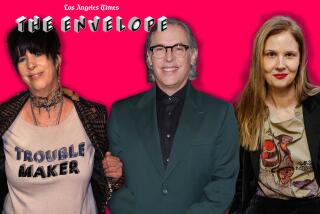‘For the Boys’ Bombards With Emotional Artillery
- Share via
If there is anything to be said for shamelessness, rest assured that director Mark Rydell is the man to say it. His geriatric “On Golden Pond” can hardly be classified as a model of emotional restraint, but all his previous work (and just about everyone else’s) pales before the bastion of unblushing, unapologetic sentimentality that is “For the Boys,” a film that not only takes you back to 1942 but plays like it was made there.
Actually, “For the Boys” (selected theaters) covers nearly half a century of American history, encompassing World War II, Korea and Vietnam, with the McCarthy blacklist thrown in as a bonus. But there’s much more than war here, there are songs, romance, comedy, temper, heartbreak, even dancing girls. Lots of dancing girls. Yet “For the Boys” is finally such a muddle that despite all this, it is impossible to say with any degree of certainty what the film is about or what it is trying to accomplish.
One of the things it is about, clearly, is providing a vehicle to allow Bette Midler to plausibly break into song as early and as often as possible. Vulnerable, brassy, endlessly talented, Midler is as good as it gets when it comes to interpreting a lyric, and when “For the Boys” lays back and allows her to sing everything from the Johnny Mercer/Harold Arlen standard “Come Rain or Come Shine” to John Lennon’s haunting “In My Life,” we are almost ready to forgive the film its baffling excess.
Midler plays Dixie Leonard, a (what else but) feisty songbird who, in the film’s framing device, is about to receive, along with her longtime partner Eddie Sparks (James Caan), something called the National Medal of the Arts from a grateful nation.
But when the inevitable limo comes to pick her up, Dixie, who has been so excessively aged she could pass for a pterodactyl, refuses to go. “I’m not getting onstage with Eddie Sparks,” she croaks, and that would appear to be that.
But given that a flat refusal would end the picture right there, the lady is coaxed into telling her life story. Back we go to 1942, when Dixie was just an unsung singer with a small son and a husband serving in North Africa. Through the good offices of an uncle in the business (George Segal), she gets offered a USO gig overseas with the famous Sparks. Dixie isn’t sure, but when a pal tells her “That’s a career-maker!” off she flies to England.
Dixie’s first encounter with Mr. Sparks and an audience of screaming GI’s jams more show business cliches into a short space of time than one would have thought possible. The result is dislike at first sight, with Dixie ready to fly back to the States and Eddie eager for her to make the trip. But, somehow, wiser heads, heads who for some inexplicable reason see them as a potential show business industry, prevail, and the singer and the comic agree to team up.
Though Midler plays Dixie like the part was tailor-made by writers Marshall Brickman and Neal Jimenez & Lindy Laub (and given that the film was developed by her production company, it no doubt was), James Caan has no such luck. A very fine actor, Caan has not been so seriously miscast since he played a Neil Simon clone in “Chapter Two.” Though we are constantly told what a brilliant comedian Eddie is and how much he is beloved by audiences everywhere, we never see so much as a hint of that allegedly enormous talent. Whether cracking jokes or pursuing women (his major avocation), Sparks never looks anything but uncomfortable, and despite what all those show-biz mavens say, we never see any evidence of a spark between him and Dixie.
But a script is a script, and lack of chemistry notwithstanding, we are dutifully expected to treat the Sparks-Leonard coupling like George Burns meeting Gracie Allen or King Kong encountering Godzilla. Even more confusing than their inexplicable decades of professional partnership is their personal relationship, which is always threatening to become romantic but instead steers a course toward the bitterness and acrimony that result in Dixie’s refusal to share that stage with Mr. Sparks.
In fact, if Rydell and his writers are relaying any message at all here, it’s not the spurious anti-war one that most of the pre-release publicity has trumpeted, but the curious notion that it’s not friendship or family but show business that forges life’s most permanent ties.
While all this may sound no more than misguided, it is Rydell’s gift for the obvious that raises it to the level of thorough bafflement. A director who believes in larger-than-life bravado, who considers cliches the truest of words and who refuses to merely hit the nail right on the head when totally pulverizing it is a possibility, Rydell has pulled out every stop he could imagine with this movie. We are amazed by his gall, and his brash energy certainly keeps boredom at bay. But for all its try-anything eagerness to please, “For the Boys” (rated R for language) can’t manage to connect with anything like genuine emotion. Finally, it becomes little more than a frantic wind machine, huffing and puffing mightily but signifying nothing very much at all.
‘For the Boys’
Bette Midler: Dixie Leonard
James Caan: Eddie Sparks
George Segal: Art Silver
Patrick O’Neal: Shepard
Christopher Rydell: Danny
Arye Gross: Jeff Brooks
An All Girl production, released by 20th Century Fox. Director Mark Rydell. Producers Bette Midler, Bonnie Bruckheimer and Margaret South. Executive producer Mark Rydell. Screenplay by Marshall Brickman and Neal Jimenez & Lindy Laub. Cinematographer Stephen Goldblatt. Editor Jerry Greenberg, Jere Huggins. Costumes Wayne Finkelman. Music Dave Grusin. Production design Assheton Gorton. Art directors Dianne Wager, Don Woodruff. Set decorator Marvin March. Running time: 2 hours, 24 minutes.
MPAA-rated R (language).
More to Read
Only good movies
Get the Indie Focus newsletter, Mark Olsen's weekly guide to the world of cinema.
You may occasionally receive promotional content from the Los Angeles Times.











